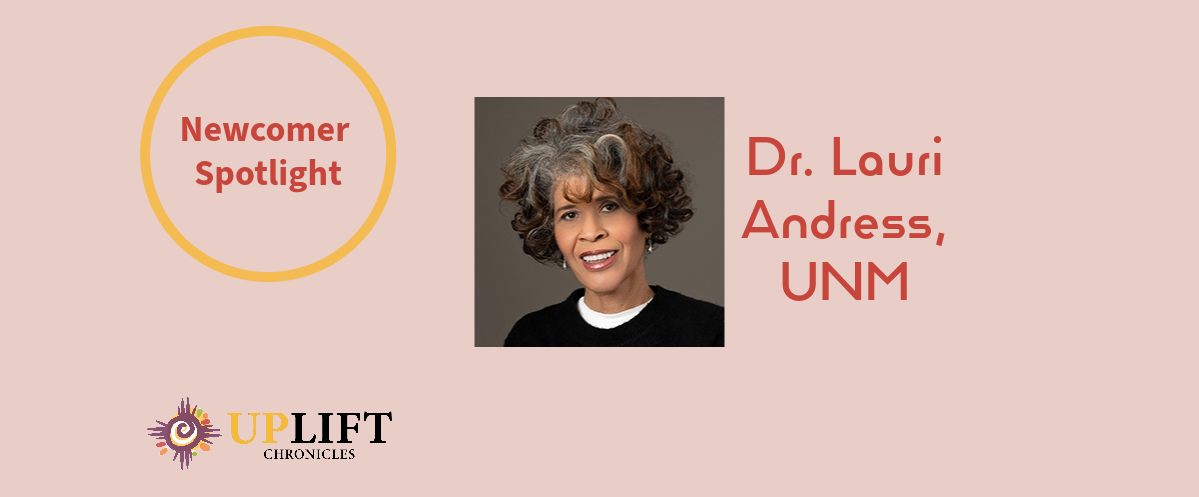This week on the blog, NMBLC features the first in the “Newcomer Spotlight” series with Dr. Lauri Andress, Associate Dean for the College of Population Health at UNM. The profile “New to Town: Dr. Lauri Andress, UNM” first appeared in the September 2023 edition of NMBLC’s monthly newspaper, the UpLift Chronicles.
For more great articles about the people, places, and happenings of Albuquerque’s Black communities, subscribe to the UpLift Chronicles.
The following piece was written by Shannon Moreau.
New to Town: Dr. Lauri Andress, UNM
Dr. Lauri Andress joined UNM this summer as Associate Dean for the College of Population Health, relocating from Birmingham, Alabama. Welcome to Albuquerque, Dr. Andress!
Below is our Q&A. Note: Answers have been edited for length.
What brought you to Albuquerque?
The opportunity to work in a collaborative manner to support Dean Tracie Collins as she builds the UNM College of Population Health. It is a positive, natural step of progression in my career.
What are you excited to bring to your new position?
A unique background in politics and community organizing that helped me to establish a set of tools that train health practitioners to understand that health starts with taking care of oppressed populations before they enter the healthcare system. This means we work on the non-medical determinants of health; [things like] voting rights, jobs, housing, wealth, the right to high-quality, affordable food sources, and early childhood education policies to support brain development and a high-quality life as an adult, or even higher levels of education, free from debt.
The pandemic’s over, right? How do we continue to increase vaccine confidence?
The pandemic is not over, and we should continue to be vigilant. Lack of confidence in the vaccine may be only one reason that groups did not get immunized. But we need to understand their lived experiences. Research demonstrated that inequities in our systems and institutions contributed to reasons that underrepresented groups did not get the vaccine. These inequities are related to…no transportation, inconvenient clinic locations and hours, language barriers, fear of loss of wages or employment to support the household.

What are some ways to increase access to care?
This is not the answer you want or perhaps expect. Increasing access to healthcare means we have failed, and people are sick or dying. It is more ethical and effective to work on those non-medical determinants of health so that people do not need [healthcare]… Both the law and healthcare are not positive services or practices and, in fact, the law and healthcare appear on the scene when society has sunk to a low point. Therefore, the law and healthcare are products and services that are to be consumed infrequently, for short periods of time, and in small quantities. To be subjected to poor health and illness and the need for healthcare because a group has suffered from the historical denial of resources and opportunities is one of the biggest injustices in our society. We should address societal inequities up front before poor health occurs, and this is where I choose to spend my time—focusing on non-medical determinants of health.
“To be subjected to poor health… and the need for healthcare because a group has suffered from the historical denial of resources and opportunities is one of the biggest injustices in our society.”
— Dr. Lauri Andress, UNM
Press
Racism in Healthcare – UNM
http://news.unm.edu/news/racism-in-healthcare
UNM College of Population Health
https://hsc.unm.edu/population-health/about/
Dr. Andress Bio – UNM
https://hsc.unm.edu/directory/andress-lauri.html
Connect with NMBLC on Social
Read the UpLift Chronicles:
Subscribe to the UpLift Chronicles

Shannon Moreau is the Editor of the NMBLC EQ Blog

Leave a Reply